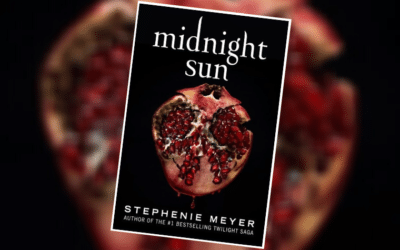 But what I found instead was a lot of foreplay and little payoff. And I don’t just mean that overly-flowery and metaphorical sex scene with the GOD who was teasing the pants off her for 220 pages. I mean it all. Was I reading a love story or a creation myth? Are these gods pansexual, fully amoral or just asshats? Is Yeine, the narrator, an inexperienced teenager or the soul of an eons-old goddess? I never settled fully into the beating heart of this book, and all its critical acclaim left me feeling bereft. Was I missing something?
But what I found instead was a lot of foreplay and little payoff. And I don’t just mean that overly-flowery and metaphorical sex scene with the GOD who was teasing the pants off her for 220 pages. I mean it all. Was I reading a love story or a creation myth? Are these gods pansexual, fully amoral or just asshats? Is Yeine, the narrator, an inexperienced teenager or the soul of an eons-old goddess? I never settled fully into the beating heart of this book, and all its critical acclaim left me feeling bereft. Was I missing something?
The heroine was supposed to be compelling and unique, a literary and literal force. And while I found Yeine’s physical description (short, brown and flat with short, almost boyishly cut, unruly hair) a welcome change from the amazonian cream-skinned curvy teenagers that permeate female-narrative fantasy novels, there was little else to recommend her in terms of originality. She’s a barbarian war-chieftainess? As a young girl, she fought off a man intending to rape her and essentially assaulted and emasculated him in front of her entire matriarchal clan? Well, where is THAT Yeine once she reaches Sky? From the start of the novel, Yeine is unsure, whiny, ineffective and anachronistic. She complains and capitulates like a middle-class American 19-year-old. Unless she’s suddenly, out of nowhere, spouting wisdom like the old Clitoral Hood Tree from Pocahontas.
 Yeine, talking about Nahadoth 100% of the time. source
Yeine, talking about Nahadoth 100% of the time. source
The world-building was supposed to be immersive and impressive. But it was scant. A giant white city in the sky inhabited by gods and ruling men should have created a presiding image, one that you couldn’t escape for its eminence. But I regularly struggled to visualize Sky The Impressive. At best, it often seemed like a more magical Minas Tirith. And a Xerox copy of it at that. The 100,000 kingdoms seemed relegated to, at most, a couple dozen. The world itself seemed small. The origin story was analogous to Judeo-Christian creationism and the theology of the Trinity, with Nahadoth being God the Father, who’s burdened with the worst of what’s been created, forced to destroy humanity until they get it right, Intempas as God the Son, who becomes the Lord of Light that everyone worships, and Enefa as God the Spirit, reduced to a kernel of life that lives within others like a parasite, but with no body of her own. If that’s a stretch then my mind is Gumby because it’s the only thing I could see every time the godswar and their history was referenced. Except for all that divine, incestual intercourse.
 Were they having sex with their kids? I can’t even tell at this point.
Were they having sex with their kids? I can’t even tell at this point.
The narrative was supposed to be fresh and layered and cliche-busting! But it was derivative, almost painfully so, and relied so heavily on this super strange and jarring writing style that I had trouble believing I was reading a heavily-nominated book. We’ve talked about how in books like The Fever Series, portentous statements like, “It was to be much later that I realized how wrong that assumption was,” can be insipid and rough to read. But, even in Darkfever, Karen Moning uses it sparingly enough that it draws the reader’s attention to plot points that make sense farther down the road. You can tell when reading book 5 in that series that Moning was alluding to important points from book 1. This is not the case here. Instead of punctuating the mythos of the story with suggested doom, it just made the narrative feel convoluted, clunky and tortuous.
So, what’s left to recommened The Inheritance Trilogy? Well, the simple fact that it IS a trilogy. The Broken Kingdoms (book 2) doesn’t fall into the same traps that The Hundred Thousand Kingdoms does. The heroine is truly unique, the magic believable, the plot well-paced, and the emotional center heavy. It greatly improves on the first, and it IS worth reading, especially if you love fantasy novels in general. And that ending? Oh baby.
My Final Boozy Review
Three Wine Bottles! Why three, if it seems like all I did was complain about it? Well, I think this book got a bad rap because it had SO much great press to recommend it. Without the ZOMG HUGO NOMINEE written in bold on every link to it, without the NPR list telling me it was a swoon-worthy romance, I could have sat down and enjoyed it for the fantasy, for the endearingness of the godling, Sieh, for the wickedness and power and torment of Nahadoth. I might have even been impressed with the love blooming between Naha and Yeine. So, I don’t think it’s a terrible book. It’s a good one. It’s just not as they sold it to me.
So … what did you think of The Hundred Thousand Kingdoms? Were you able to give the rest of the series a shot, or did you give up? Did you love it, and if so, can you explain why it’s ZOMG SO AWESOME to me?
TN’s Boozy Book Club meets continually on Goodreads, reading two new books every month. Every quarter, we get together live on YouTube to get boozy and discuss our favorites. If you haven’t already, join our Goodreads Group, friend me on Goodreads, and watch some of our past hangouts about some of our favorite novels.




